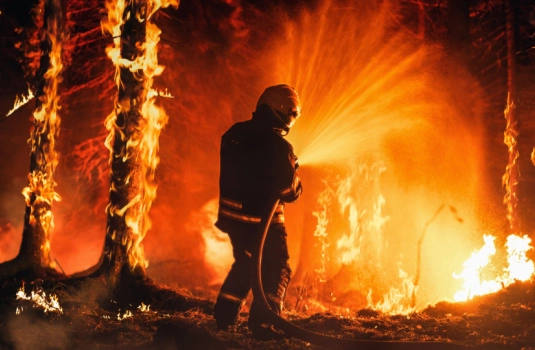
You hear about climate change all the time. But what does it mean to those living here in the Peach State? And what can be done about it if you’re a homeowner?
For starters, make sure you have a quality homeowners insurance plan that can help you protect your finances against the damage that climate change can inflict on your home. You should also know the various forms that these weather threats might take.
So here’s what you and your finances might be up against in the coming years, thanks to the extreme weather brought about by climate change.
Smoke and Flame Damage from Wildfires
When you think of wildfires, California probably comes top of mind. After all, that’s what you see in the news, year after year. So, it might surprise you to learn that Georgia gets about 3,500 wildfires every year. After all, there are a lot of forested acres in the state. Some of it is dangerously close to populated areas.
As temperatures rise and droughts become more common, these fires may happen more frequently. You and your family can get in your car and move out of the path of the roaring flames-but your house can’t.
There’s not much you can do about that, but you can help lower the risk of fire or smoke damage. For instance, install a Class-A non-combustible roof. Keep fire tinder-type vegetation away from your house, and seal holes and other openings where smoke and fire embers might find a way in.

Hurricane and Windstorm Damage to Coastal Areas (and Beyond)
Georgia has a lot of coastal land – about a hundred miles of Atlantic Ocean coastline and 14 barrier islands – and is a great place to vacation or even call home. But you must consider that those living near those waters, and other areas of Georgia, are subject to the hurricanes that sweep north every year.
Scientists believe climate change increases the strength and intensity of hurricanes and the ferocity of the rains that accompany them. And the rising sea levels brought about by the melting of glaciers due to climate change mean more coastal storm surge.
Your best defense is to take a hurricane warning seriously. Fortunately, most hurricanes usually give at least 24 hours’ warning. Use that time to remove objects from your yard, such as tools or lawn ornaments that can be propelled like missiles by strong winds. If your home is located close to the coast, it might be outfitted with shutters that close over windows. Others nail up plywood over the glass.
Whatever you do to protect your home against hurricane damage, remember that glass and wood, and shingles can all be repaired or replaced. It’s more important to keep yourself and your family safe. When urged by authorities to evacuate, do so. You can always contact your insurance agent later about structural damage.
Increased Temperatures Increase AC Cost
This isn’t a matter of damage to your home as much as it’s something that can batter the family budget. You probably run your air conditioning 24/7 during the long and hot Georgia summers. But with climate change, those hot seasons are starting earlier and lasting longer.
Consider installing ceiling fans so you can avoid those high energy bills for as long as possible. Open windows and draw drapes to keep the radiance of the sun out. If you have tall Georgian shade trees on your property, they can also extend some solar protection and keep the place feeling cooler for longer.
Review Your Homeowners Insurance Policy
Georgia homeowners need to acquaint themselves with the concept of adaptation and mitigation when it comes to climate change and its possible effect on homes. That means recognizing that extreme weather is a new reality, but actions can be taken to address the challenges and minimize the various threats as much as possible.
One of your best defenses against this new reality is to make sure that your homeowner’s insurance keeps up with the times. Take out your policy and read it (quite possibly for the first time). Or meet with your homeowner’s insurance agent to review the benefits you currently have and see what you might want to add or change to maintain ultimate protection.